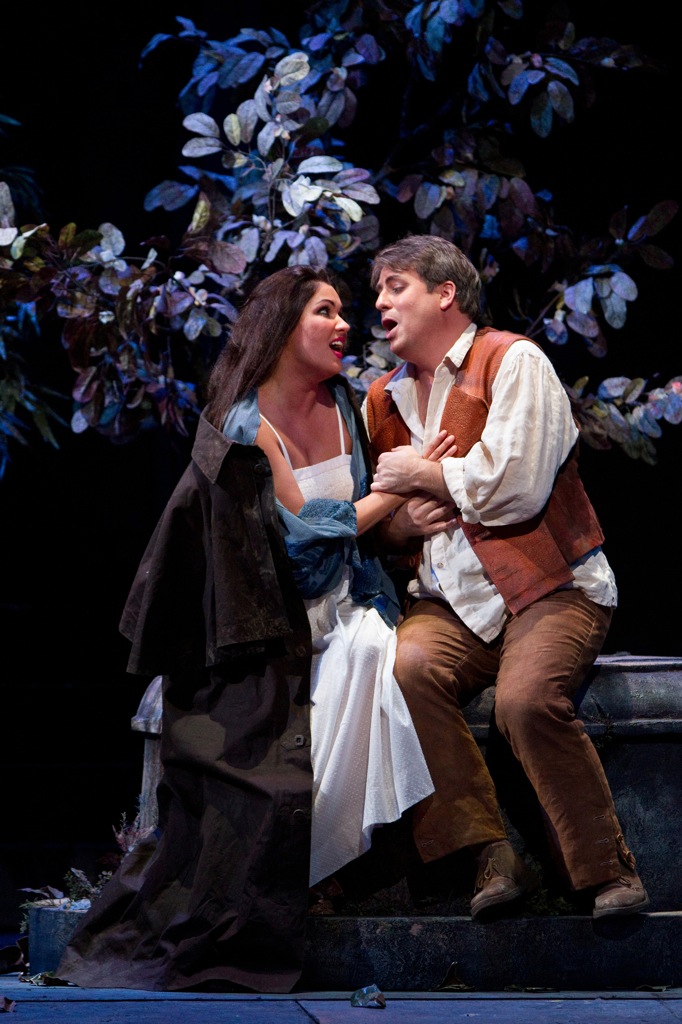Netrebko’s delightful Norina again lifts the Met’s “Don Pasquale”

Anna Netrebko and Matthew Polenzani in the Metropolitan Opera production of Donizetti's "Don Pasquale," Photo: Marty Sohl/Metropolitan Opera
When it comes to opera roles celebrated for showing off sopranos, one does not think immediately of Norina in Don Pasquale. But Anna Netrebko caused one to think again when the Metropolitan Opera created a new production of the opera with her as a star attraction in 2006.
Donizetti’s delightful comedy has returned to the Met stage for the first time since the production’s initial season, with two new significant cast members and a new conductor. Still, it is very much Netrebko’s show. Some may have thought that, having given birth to a child since she last sang Norina here, she might this time be more matronly and less energetic in the role. Any such fears were quickly put to rest when she sang her coquettish entrance aria with her characteristically girlish allure, while simultaneously putting on a pair of stockings. And after she finished singing the duet in which she and the conniving Dr. Malatesta plot her sham marriage to the elderly Don Pasquale, she does a somersault, as before. As the supposed Sofronia, she was particularly amusing when registering extreme modesty, all wrapped up in white veils and swooping through Pasquale’s living room as if dressed as a ghost for Halloween.
Vocally too she was in excellent form on Tuesday night. Bel canto operas have not proven to be her great strength, as appearances here in Lucia and I Puritani have demonstrated. Norina, though, suits her very nicely, even if there was sometimes a lack of clarity in quick scale passages and her decision to attempt a high D at the end of Act 2 was ill-advised. But she sounded gorgeous, her tone consistenly lustrous, resonant and beautifully rounded.
Her Pasquale is now John del Carlo, who has proved his worth as a basso buffo in roles like Dr. Bartolo (both Rossini’s and Mozart’s) and the Sacristan and who sang a single performance of Pasquale when the production was new. Del Carlo does very well; the voice has the requisite imposing sound and its quality is good. He could have projected a little more strongly in his early aria Un fuoco insolito but otherwise sang heartily. And del Carlo succeeds in conveying Pasquale’s humorous side as well as his desperation without overacting.
Matthew Polenzani, who sings the role of Ernesto (Pasquale’s nephew and Norina’s lover) for the first time at the Met, contributes a handsome, stylishly sung portrayal, though not one that effaces memories of Juan Diego Florez. Polenzani is good at projecting the essence of a phrase, although his quick vibrato sometimes interferes with the smoothness of the more lyrical numbers. And, oddly, in the Act 3 Serenade he sounded more polished in the first verse, sung offstage, than in the second, when he was before the audience. The cabaletta E se fia che ad altro oggetto was shorn of its second verse.
Mariusz Kwiecien reprises his vocally gorgeous, dramatically quick-witted Doctor Malatesta. His is an outstanding portrayal, even if he does add a rather silly cadenza to Bella siccome un angelo.
This is not repertory normally associated with James Levine, but it was a treat to find him in the pit for this opera, which he had not previously conducted. It was clear from the flexibility of tempo he brought to the tune of Norina’s aria in its appearance during the overture that the opera was in good hands.
Otto Schenk’s production generally respects the line between comedy and silliness, but I have reservations about Rolf Langenfass’s décor. Pasquale’s living quarters are needlessly dreary, thereby making Sofronia’s reckless decision to do the place over seem like a good idea. And a drop curtain depicting an urban working-class neighborhood is hardly the section of Rome where Pasquale’s townhouse is likely to be situated.
Don Pasquale runs through Nov. 18 and returns for five more performance in February (Feb. 4-19). metoperafamily.org The Nov. 13 matinee will be transmitted live as part of The Met: Live in HD series.